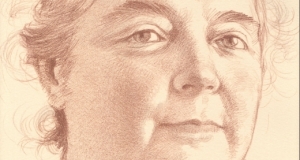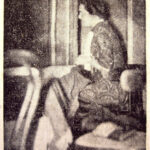
A common characteristic of xenophobic nationalist movements – in the past as well as the present – is that many of their supporters deny that they hold bigoted views. Instead, they use coded language to advance exclusionary conceptions of national belonging. Interwar France’s radical-right Croix de Feu/Parti Social Français (CF/PSF, 1927-45) – one of the largest and most powerful movements in French history – provides a telling example.
To understand why, it’s helpful to start with Suzanne Fouché, who became a leading disability rights activist in post-war France. Well-known in conservative Catholic circles in the 1930s and a supporter of the CF/PSF, Fouché subscribed to the CF/PSF’s claim that France was a Christian nation, and that it was the duty of all French to accept this heritage at the expense of the country’s long Jewish, Muslim, and secular history. The anti-fascist Popular Front recognized – and named – this as contrary to liberal values.

The key to this transformation, she maintained, was to develop fully all six human senses. The traditional five senses put individuals into contact with the world around them, but they left people trapped in a superficial perception of the external world. The sixth sense – the “social sense” – went further. It allowed an individual to feel, as Fouché explained, “the sentiment of our inter-dependence”; as paraphrased by conservative newspaper, the individual was one “living cell” in “the grand body.” Fouché and her supporters claimed that an emphasis on collective good led to humane action. In the 1930s, however, her rejection of individual rights and needs in favor of a religiously homogenous social body had dangerous ramifications.
Like many authoritarian ideas, Fouché’s views and CF/PSF ideology converged around the notion of chaos and the call for renewal. The democratic Third Republic was broken; only social sense – not political action – could form “the base of French reconstruction.” Fouché trained hundreds of young women to work for CF/PSF social programs, which exploded in popularity from 1935-1940 and thrived under the Vichy regime (1940-1944). The women organizers stated they were for the “French first” and encouraged participants to learn Catholic doctrine and engage in Catholic rituals. CF/PSF social action undermined the secular programs of the leftist Popular Front, which were oriented to the working class and inclusive along the lines of nationality.
Perhaps the most important proponent of CF/PSF social action was its leader Colonel François de La Rocque, who considered parliamentary politics akin to a virus that had infected French society, eroded national harmony, and led to societal “decomposition.” Such contempt for democratic politics led the Popular Front to label the CF/PSF “fascist” and to compare La Rocque to Hitler and Mussolini.
Yet many CF/PSF adherents found these charges implausible – among other reasons because in their focus on La Rocque and the actions of CF/PSF men, the Popular Front overlooked CF/PSF social programs. Fouché insisted that her commitment to suffering and redemption made her the opposite of fascists like Hitler and Mussolini, whose parties championed political violence. And this was not simply a feminized ghetto. CF/PSF propagandists adopted the slogan “Social First!” While social action was not as spectacular as mass rallies or paramilitary parades, CF/PSF leaders believed that it would resonate among the French people. Drawing on experiences in empire, the movement’s leader in Algeria explained:
People often ask me this question: What will make La Rocque act like Hitler or like Mussolini? Invariably I respond: Our President would act like Mussolini in Italy, and like Hitler in Germany. But in France, in the French milieu, he will act like the French…Some are impatient and find our progress too slow. Hitler wanted to act too quickly, and spent two years in prison. To act, we must have the adherence of the vast majority of the country.
CF/PSF leaders understood that an authoritarian government could not be imposed upon a people but required a degree of consent.
In emphasizing social action, the CF/PSF played a critical role in diverting the public’s attention away from politics. The movement thus undermined public faith in one of the basic principles of the Third Republic – that a relationship existed between secular civic virtue and political participation. Few mourned the Third Republic when it fell in 1940 due to the Nazi invasion and was replaced by the authoritarian, Catholic, antisemitic Vichy regime.
The collapse of support for French democracy in 1940 had been prepared through the actions of individuals and groups in the 1930s. Fouché had had no problem supporting a movement whose leaders compared it to Nazism and Fascism, as she insisted that her concerns were not political but social; not material but spiritual; not temporal but transcendental. Her conferences and courses had attracted many people who might otherwise have found the CF/PSF’s extreme politics unacceptable. While the Popular Front attempted to reform the Third Republic, the CF/PSF worked to mainstream authoritarianism through a social language of suffering and redemption.
What does this teach us? Perhaps the most poignant lesson is the way women and men engaged in processes perpetuating a sense of crisis and feeding xenophobic nationalism. Understanding this process helps us to identify missed opportunities to contest it. The Popular Front overlooked women’s central role in the CF/PSF. It had a blind spot as to how the emotions brought about by the language of suffering and redemption resonated with sectors of the French population who rejected the political violence of Nazism and Italian Fascism.
Just as the Popular Front did in the 1930s, many people today misinterpret the role of women and religion in xenophobic nationalism. Commentators were shocked when 53 percent of white women voted for Trump; analysts sought to understand the reasons for his strong support among Christians (60 percent of white Catholics, 81 percent of white evangelicals, and 56 percent of weekly church-goers). It is revealing that Steve Bannon has connections with arch-conservatives in the Vatican who assert that the West is a Christian civilization which is weakening due to “family breakdown” and facing an existential threat from “radical Islam.” While the current Pope has sought to marginalize those pushing this “clash of civilizations” ideology, it resonates among large segments of the U.S. population, just as it did among many French Catholics of the 1930s.
It would be useful for Americans contesting incipient authoritarianism to understand better how supporters of Trumpism use religious language – one that is rife with emotions – to frame our supposed national crisis. The emotive language they use likely varies according to context (place, social group) but shares a frightening commonality in that it diminishes individuals and groups who supposedly undermine the renewal of Christian civilization.


Leave a Reply